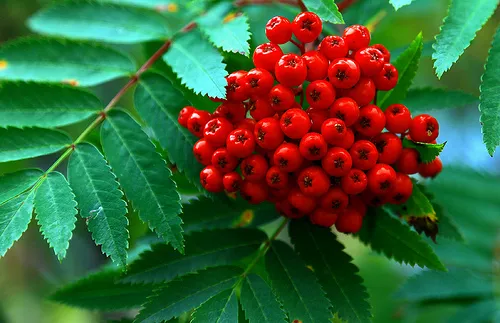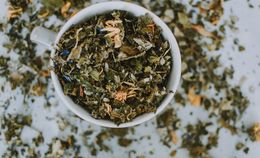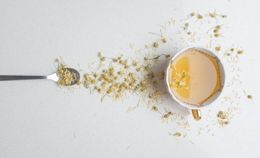As an autoimmune condition, Graves’ Disease is considered a chronic, lifelong illness once diagnosed. Although this statistic might sound, well...a bit grave, there are many different herbal therapeutics and natural strategies you can employ to manage your symptoms and elevate your wellbeing in a lasting way. Read on as I share some of my favorite herbal therapeutics for supporting Graves’ Disease.
Love Your Thyroid
As you might already know, Graves’ Disease is largely connected with your thyroid. One of the leading characteristics of Graves’ Disease is when our thyroid hormones start overproducing. Given the array of uncomfortable and life-quality-changing symptoms this can cause, it might feel easy to place the blame on your thyroid: “how could my thyroid do this to me?” or “why is my thyroid hurting me like this?” In actuality, our thyroid is calling out for love and support. The thyroid simply became confused when to signal for more thyroid hormones to be released, causing it to over-communicate to the pituitary gland and create an excess of thyroid hormones in the body (i.e. hyperthyroidism). Although there are a lot of beneficial herbs that can help regulate thyroid function (so your thyroid starts to feel the love and support it needs), for Graves’ Disease there is one herb that has been used traditionally and in modern practice with more success than others: bugleweed (Lycopus virginicus or L. curopaeus). Not only is bugleweed a superb relaxing nervine (which we will talk about later in this article), it has been found to dramatically improve the overall symptom picture connected with Graves’ Disease. The organic acids found in bugleweed are believed to help decrease thyroid hormones and inhibit the binding of antibodies to the thyroid gland.

Promote Stress Resilience
Although it's easier said than done, regulating and reducing your stress levels can play a BIG role in controlling autoimmune flares of Graves’ Disease. Oftentimes, chronic stress or a major life trauma precedes the diagnosis or onset of Graves’ Disease as well. When we become “stressed,” our cortisol and adrenaline levels can spike which messes with our overall neurotransmitter function. This, in turn, can create or worsen symptoms of Graves’ Disease. How can herbs help balance our stress response? With my clients, I like to focus on cultivating stress resilience instead of stress palliation. Drawing from herbs like tulsi (Ocimum sanctum), ashwagandha (Withania somnifera), rhodiola (Rhodiola rosea), and reishi (Ganoderma lucidum) can all help rebalance the way our body handles stressors (big and small, new or recurrent) so that we can start responding to inevitable stress in our lives instead of reacting.
Reducing + Regulating Inflammation
One of the best ways to boost our immune system and balance autoimmune-triggered flares is to regulate our inflammatory response system. Believe it or not: signs of inflammation are actually a good thing because they alert the body that something deeper is going wrong inside. However, once the root of the inflammation is identified and it has become more of a chronic issue, reducing and modulating our inflammatory levels is crucial. Our diet and nutrition play a foundational role in this, in addition to herbal anti-inflammatory support. Some of my favorite inflammation-modulatory herbs include calendula (Calendula officinalis), turmeric (Curcuma longa), white willow bark (Salix alba), and ginger (Zingiber officinale).
Relaxing Nervines
Since Graves’ Disease is largely characterized by a state of nervous agitation, anxiety, irritability, and hyper-excitement, relaxing nervine herbs are great to utilize. Bugleweed (mentioned above) is specifically indicated for Graves’ Disease and hyperthyroidism in addition to relaxing the nervous system. Other relaxing nervine herbs I use to support the symptoms connected with Graves’ Disease are motherwort (Leonurus cardiaca), skullcap (Scutellaria spp.), valerian (Valeriana officinalis), and passionflower (Passiflora incarnata). Many of these herbs carry a sedative action as well, making them ideal to utilize if insomnia is a part of your symptom picture too.
Heart Tonics
Graves’ Disease can significantly impact our heart function, causing symptoms such as rapid pulse both at rest and during physical exertion and heart palpitations. When our body is burdened with a hormonal overload, our cardiac function can suffer as a result. Heart tonic herbs are wonderful to use for soothing and regulating these specific symptoms of Graves’ Disease. One of my favorite heart tonic herbs to use is hawthorn (Crataegus spp.). I prefer to use the berry, leaf, and flower of hawthorn altogether if possible although all parts lend heart tonifying function.
Building Your Support System
Note that the herbs above are best used to support certain symptoms and root causes of Graves’ Disease in conjunction with prescription medications. Graves’ Disease and hyperthyroidism have a much lower threshold when working with only natural therapeutics as opposed to other thyroid conditions and should be closely monitored with your entire health team including your professional medical doctor, Clinical Herbalist, and other alternative healthcare practitioners.





















